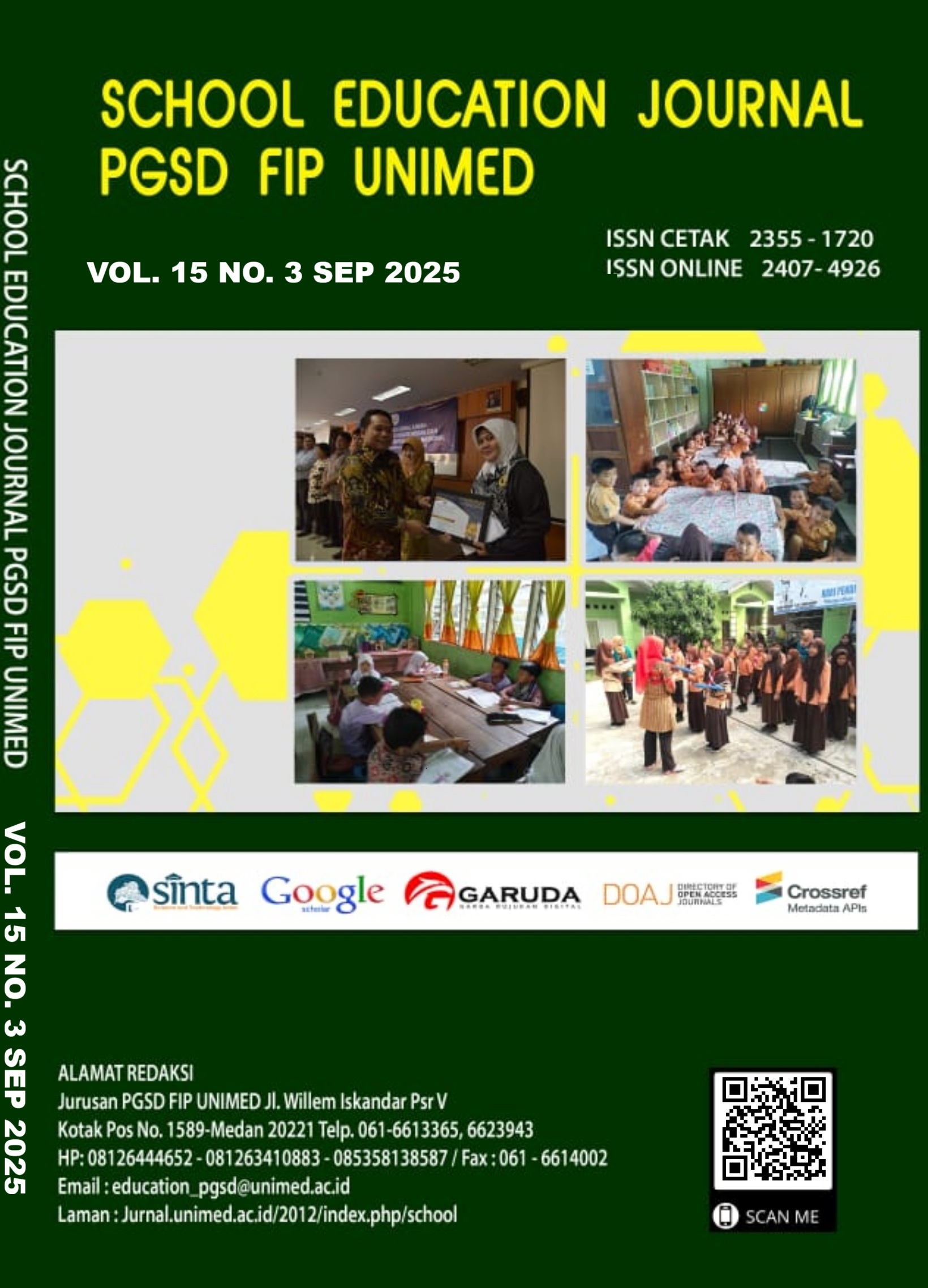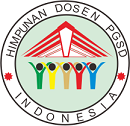SYSTEMATIC LITERATURE REVIEW: PENGEMBANGAN MEDIA FLIPBOOK INTERAKTIF UNTUK PEMBELAJARAN MEMBACA PEMAHAMAN DI ERA DIGITAL
DOI:
https://doi.org/10.24114/sejpgsd.v15i3.68452Keywords:
Interactive Flipbook, Reading Comprehension, Digital LearningAbstract
Reading comprehension skills are the foundation of learning, yet they remain a major challenge in Indonesian education, as evidenced by the 2021 PIRLS results, which ranked Indonesia at the bottom. The digital age demands a transformation in learning that integrates multimedia technology to meet the needs of Generation Z. This study uses the Systematic Literature Review method with the PRISMA guidelines to analyse the characteristics and effectiveness of interactive flipbooks in reading comprehension learning. The literature analysis indicates that interactive flipbooks have a pedagogical design that aligns with modern learning needs by coherently integrating text, audio, visuals, and interactive elements. This medium has been proven to enhance text comprehension and student motivation and provide ease of access for flexible learning. Interactive flipbooks serve as a practical solution supporting the development of 21st-century skills and student-centred learning in the digital age.References
Anggraeni, M., & Mukhlis, M. (2023). Asesmen Kompetensi Minimum Literasi Membaca Siswa di SD Negeri 09 Merangkai. Bahasa Dan Sastra, 9(1), 313–325. https://e-journal.my.id/onoma
Atika Anggrasari, L., Permatasari Kusuma Dayu, D., Ambar Widihantari, T., & Dwi Setyaningsih, N. (2021). The Effect of the Use of Flipbook Culture Story Media on Reading Literations of Elementary School Students. https://www.atlantis-press.com/proceedings/icce-20/125952345
Atin Uswatun, I. K., & Kurniati, E. (2024). Implementation of Project-Based Learning Model with Digital Flipbook Media in Story Texts Learning. 26(2), 700–714. https://doi.org/10.21009/JTP2001.6
Chuang, C., & Jamiat, N. (2023). A systematic review on the effectiveness of children’s interactive reading applications for promoting their emergent literacy in the multimedia context. In Contemporary Educational Technology (Vol. 15, Issue 2). Bastas. https://doi.org/10.30935/cedtech/12941
Fitria, A. (2024). Penerapan metode pembelajaran cooperative integrated reading composition (CIRC) berbasis media flipbook dalam meningkatkan membaca pemahaman Siswa. https://doi.org/10.47200/aoej.v15i1.2161
Gede, I., & Suputra, R. (2024). Online Flipbook for Facilitating Reading Activity in an Inclusive Class. Journal of Educational Study, 4(2), 149–160. https://jurnal.stkipahsingaraja.ac.id/index.php/joes/article/view/987
Gusti Ayu Made Mia Arisandhi, I Made Citra Wibawa, & Kadek Yudiana. (2023). Flipbook: Media Pembelajaran Interaktif Untuk Meningkatkan Kognitif IPA Siswa Sekolah Dasar. MIMBAR PGSD Undiksha, 11(1), 165–174. https://doi.org/10.23887/jjpgsd.v11i1.55034
Hadi, A. S., Rahayu, S. E., & Saputro, B. (2025). Validity and Practicality: Development of an Interactive Flipbook to Enhance Students Knowledge and Digital Literacy. Journal of Natural Science and Integration, 8(1), 111. https://doi.org/10.24014/jnsi.v8i1.34901
Harianto, E. (2020). Keterampilan Membaca dalam Pembelajaran Bahasa. In DIDAKTIKA (Vol. 9, Issue 1). https://jurnaldidaktika.org/
Jainab, J., Lisnasari, S. F., Datten, D., & Pelista, P. (2025). Media-Based Learning Management Using Flipbook and Dakota to Improve Elementary Students’ Literacy and Numeracy. Formosa Journal of Multidisciplinary Research, 4(2), 507–518. https://doi.org/10.55927/fjmr.v4i2.73
Korat, O., & Falk, Y. (2019). Ten years after: Revisiting the question of e-book quality as early language and literacy support. Journal of Early Childhood Literacy, 19(2), 206–223. https://doi.org/10.1177/1468798417712105
Liman Kaban, A., & Karadeniz, S. (2021). Children’s Reading Comprehension and Motivation on Screen Versus on Paper. SAGE Open, 11(1). https://doi.org/10.1177/2158244020988849
Manjillatul Urba, Annisa Ramadhani, Arikah Putri Afriani, & Ade Suryanda. (2024). Generasi Z: Apa Gaya Belajar yang Ideal di Era Serba Digital?. DIAJAR: Jurnal Pendidikan Dan Pembelajaran, 3(1), 50–56. https://doi.org/10.54259/diajar.v3i1.2265
Mursidi, A. P., Prananto, I. W., Arifani, F., & Setyawati, R. (2022). Pengembangan Flipbook Interaktif untuk siswa kelas 5 sekolah dasar pada materi siklus air. Jurnal Ilmiah Pendidikan Dasar, 9(2), 128. https://doi.org/10.30659/pendas.9.2.128-141
Nafiah, N., Syamsul Ghufron, Sri Hartatik, Pance Mariati, & Afib Rulyansah. (2023). The effect of flipbook-based digital books on elementary school students’ interest in learning. World Journal on Educational Technology: Current Issues, 15(4), 342–354. https://doi.org/10.18844/wjet.v15i4.7833
Perdana, R., Nasution, I. S., & Sagala, F. H. (2025). Transformasi Pembelajaran Membaca Pemahaman melalui Model RADEC Berbasis Flipbook Digital. Pedagogika: Jurnal Ilmu-Ilmu Kependidikan, 5(1), 50–56. https://doi.org/10.57251/ped.v5i1.1684
Rahayu, D., Pramadi, R. A., Maspupah, M., & Agustina, T. W. (2021). Penerapan Media Pembelajaran Flipbook Interaktif untuk Memingkatkan Hasil Belajar Siswa. Indonesian Journal of Mathematics and Natural Science Education, 2(2), 105–114. https://doi.org/10.35719/mass.v2i2.66
Rahma, R., Andayani, & Anindyarini, A. (2024). Teaching reading in digital era: Exploring Indonesian in-service teachers’ perceptions and challenges. Contemporary Educational Technology, 16(4). https://doi.org/10.30935/cedtech/15159
Rahmadani, E., & Bungawati. (2024). Innovation of Flipbook Teaching Materials in Supporting Student Learning Independence. 11(1), 176–189. https://doi.org/10.53400/mimbar-sd.v11i1.61620
Rahmayanti, W., Indriyani, & Destrinelli. (2025). Literasi Peserta Didik: Pencapaian Melalui Rapor Satuan Pendidikan Sekolah. Didaktika: Jurnal Kependidikan, 14(2). https://jurnaldidaktika.org
Riski, Y. T., Huda, N. M., Permatasari, D., & Dayu, K. (2025). Utilization of Flipbooks for Reading Skills in Indonesian School Students Davao Philippines. Jurnal Reviu Pendidikan Dasar: Jurnal Kajian Pendidikan Dan Hasil Penelitian, 11(1). https://doi.org/10.26740/jrpd.v11n1.p62-72
Santia, E., & Nurmayani, N. (2023). Bahan Ajar Flipbook Interaktif Berbasis Problem Based Learning Untuk Meningkatkan Pemahaman Materi Siswa Sekolah Dasar. Paedagogi: Jurnal Kajian Ilmu Pendidikan (e-Journal), 9(1), 116. https://doi.org/10.24114/paedagogi.v9i1.46101
Sari, W. N., & Ahmad, M. (2021). Pengembangan Media Pembelajaran Flipbook Digital di Sekolah Dasar. Edukatif: Jurnal Ilmu Pendidikan, 3(5), 2819–2826. https://doi.org/10.31004/edukatif.v3i5.1012
Tedja, B., Al Musadieq, M., Kusumawati, A., & Yulianto, E. (2024). Systematic literature review using PRISMA: exploring the influence of service quality and perceived value on satisfaction and intention to continue relationship. Future Business Journal, 10(1). https://doi.org/10.1186/s43093-024-00326-4
Thoriq, M., Kusuma, A., & Muharom, F. (2024). Transformasi Peran Pendidik dan Tren Pembelajaran Digital di Era Teknologi. IJCE (Indonesian Journal of Community Engagement), 1(2), 84–97.
Widhiyastuti, A., Subiyantoro, S., & Yulisetiani, S. (2025). Utilization of Flipbook Media in Indonesian Language Learning at Elementary School. Social, Humanities, and Educational Studies, 8(1). https://jurnal.uns.ac.id/shes
Zuhri, R. S., Wilujeng, I., Haryanto, H., & Ibda, H. (2024). Information communication technologies education in elementary school: a systematic literature review. Journal of Education and Learning, 18(3), 1078–1090. https://doi.org/10.11591/edulearn.v18i3.21435
Additional Files
Published
Issue
Section
License
Copyright (c) 2025 SCHOOL EDUCATION JOURNAL PGSD FIP UNIMED

This work is licensed under a Creative Commons Attribution-ShareAlike 4.0 International License.
Authors whose manuscripts are approved are approved as follows:
- The publication rights for all journal manuscript materials published/published on the SEJ (School Education Journal) E-Journal site are held by the editorial board with the author's knowledge (moral rights remain with the manuscript authors).
- The formal legal requirements for accessing this electronic digital journal article are subject to the terms of the Creative Commons Attribution-ShareAlike (CC BY-SA 4.0) license, which means that E-Journal SEJ (School Education Journal) has the right to store, transfer media/format, manage in the form of a database, maintain, and publish articles without asking permission from the author as long as the author's name remains as the copyright owner.
- Manuscripts published/published electronically are open access for educational, research, and library purposes.













